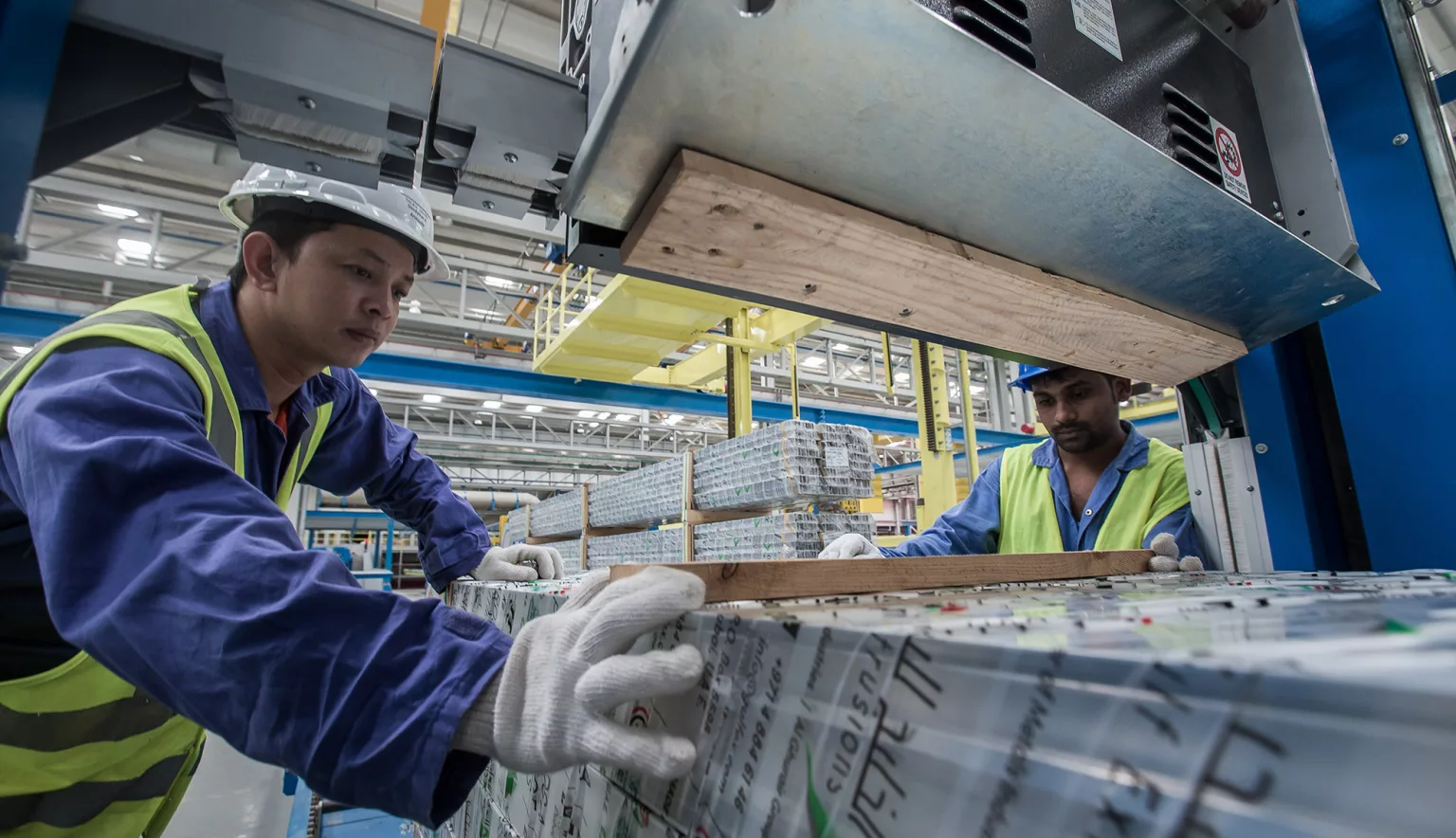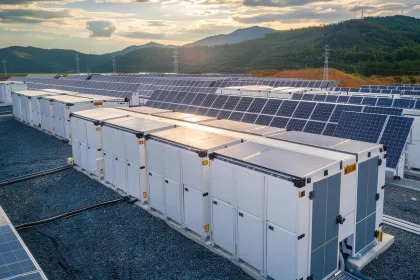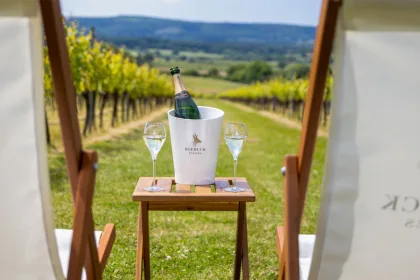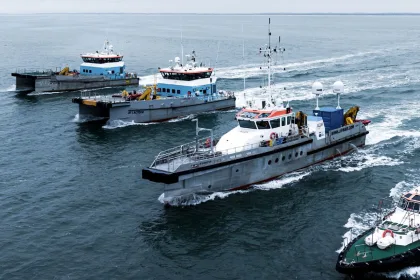Gulf Extrusions has enacted a number of projects which are delivering a competitive advantage to the benefit of its customers, from state-of-the-art die simulation to several environmentally beneficial initiatives.
ALUMINIUM EVERYWHERE
Aluminium is everywhere. Lightweight and silvery-white in appearance, it is the most abundant metallic element found in the earth’s crust and the most widely used nonferrous metal in the world.
The name can be credited to British chemist Sir Humphry Davy, who in 1809 created an iron-aluminium alloy by electrolysing fused aluminium oxide before crude aluminium (1825) and aluminium powder (1827) were discovered respectively in Denmark and Germany.
Required in all shapes and sizes, the production of aluminium is more complex than one may initially think.
Christian Witsch is the CEO of Dubai-based aluminium extrusion company Gulf Extrusions, an Emeriti mainstay since its foundation all the way back in 1976.
“I gradually got more involved in machine building and architectural solutions and was becoming a part of the solution,” Witsch recalls. “From thinking at the beginning that it was a simple, routine process, my viewpoint changed completely and drastically – you learn a lot from aluminium extrusion.
“You master complex shapes and complex requirements. For example, you have to manage between decorative requirements to make the products look beautiful and at the same time accomplish tighter tolerance. It is a huge field full of learning, optimising and engagement, and you are developing thousands of new solutions per year.”
Today, Witsch leads a dynamic and increasingly extensive series of aluminium extrusion operations.
For instance, Gulf Extrusions recently acquired Abu Dhabi-based firm TALEX, which has brought mainstream activities into the emirate and delivered multiple strategic advantages. Not only is the newly acquired, state-of-the-art plant located in the Khalifa Industrial Zone (KIZAD) alongside key supplier EGA, it is ideally situated to export from KIZAD Port to the rest of the world, its network bolstered by warehouses in the UK, Netherlands and Saudi Arabia.
Its work can be seen globally, especially on prestigious regional hallmarks.
“We are very proud of having supplied the aluminium extrusions which were used to install the LED screen of the Burj Khalifa in Dubai. We did that, in the space of a month which is a very short period of time for that kind of project,” Witsch comments.
This is one of many local examples, the CEO also expressing pride in the aluminium stars the firm produced for Abu Dhabi’s Louvre Museum. In the automotive sphere, the company’s specialist fabrication plant supply parts to global supply chains with products being built into automotive car bodies for companies including Jaguar, Range Rover, Jeep, and BMW.
BECOMING A SMARTER, GREENER ENTERPRISE
And Gulf Extrusions continues to pioneer and innovate.
For example, a key priority for 2021 is the upgrade of its Building System, a move which will enable the firm to deliver higher spec projects and better serve customers.
“This represents the company building on four decades of experience in serving the regional construction industry,” Witsch expands.
“The new system allows Gulf Extrusions to provide a one-stop-shop for clients, in that it now can offer products beyond the aluminium component of a product or structure. It provides more accountability and transparency for customers, which is really important.”
Customers are also being better served thanks to an ever-evolving Extrusion Management System (EMS), a tool which enables employees to monitor the progress of any customer order and its flow sequence at different stages of the production process.
First installed in 2015, EMS is custom-made software that covers the entire lifecycle of a project, from planning through die shop, extrusion, anodising, powder coating, fabrication and packing.
“There are more specific advantages of EMS as well,” Witsch explains. “For example, in relation to extrusion, it captures and saves all essential process parameters billet by billet as a recipe, and thus furnishes the best one to the operator when the same die or product is extruded next time.
“This helps to optimise the process which in turn helps us improve productivity and ensure consistent product quality, which is also an important factor for customer satisfaction.”
Another critical optimisation tool is die simulation. Dies are the moulds which cut aluminium during the extrusion process, products which Gulf Extrusions receives from specialised suppliers.
Such dies are often highly complex shapes and therefore require stringent testing before being used, a process which is carried out in-house by the Gulf Extrusions die shop – a key part of the overall operation.
Installed at the start of January 2018, die simulation predicts how a die will perform. It identifies issues and is used to inform modifications and corrections, saving time and considerable sums of money to put a die through a retesting process.
More recent innovations include the anodising of a new special range of colours. Brought in midway through 2020, customers now benefit from a wider choice of finishes, which now include copper, diamond and stainless-steel.
“We previously had a limited range of colours which covered mostly silvers and bronzes,” Witsch says. “Our new colouring tank and process now means we can produce a broader range of colours, including a variety of copper finishes. Feedback from customers has been excellent regarding the new choice and consistency of finish.”
Gulf Extrusions is also going green.
A major breakthrough is about to be enacted at the TALEX plant in Abu Dhabi, which will become the first customer in KIZAD to switch from LPG to a direct supply of natural gas. The project was initiated at the start of 2020 and is the result of meticulous planning and attention to detail regarding safety with key partners.
“We have been working on this transition ever since we acquired TALEX,” Witsch adds. “This is a stepping-stone towards improving our operational efficiency and being more competitive in both local and global markets. It is very much a joint achievement with KIZAD and has further strengthened our long-standing relationship.”
Such recent progress is remarkable given the current backdrop the industry is up against. Over the past year, huge disruptions caused by the coronavirus pandemic have taken hold all over the world, the virus continuing to pose health, social and economic challenges that will last well into 2021.
But Witsch is an optimist, his concluding remarks pointing towards a future of sustained innovation and creativity.
“Aluminium is always a developing sphere,” he says. “Due to the economic impact of COVID-19, it is developing faster because in time of crises, it is important to be innovative and come up with new solutions. It is a time of the highest innovation and the fastest development, and our team has become even more creative and innovative in terms of streamlining processes.”






























